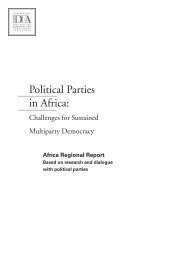Background Document - Danish Institute for Parties and Democracy
Background Document - Danish Institute for Parties and Democracy
Background Document - Danish Institute for Parties and Democracy
You also want an ePaper? Increase the reach of your titles
YUMPU automatically turns print PDFs into web optimized ePapers that Google loves.
Of course this search will also build on all the wealth of knowledge others have already<br />
accumulated. The journey we have travelled so far indicates that many different<br />
areas need to be dealt with in a strategic manner to ensure progress: Equal constitutional<br />
rights <strong>for</strong> women <strong>and</strong> men need to be included; different electoral systems can<br />
offer different avenues; the use of quotas or reserved seats <strong>for</strong> women can be considered;<br />
the role of party rules <strong>for</strong> recruitment procedures should not be underestimated;<br />
capacity development to strengthen skills <strong>and</strong> resources of women is needed; <strong>and</strong> re<strong>for</strong>m<br />
of the rules <strong>and</strong> internal procedures within parliament may also be helpful.<br />
Changes in institutional structures <strong>and</strong> regulations are often possible in the shortterm.<br />
But history tells us – including the successful <strong>Danish</strong> history – that egalitarian<br />
attitudes towards women <strong>and</strong> men, improvements in human development, <strong>and</strong> societal<br />
modernisation are long-term undertakings. After all, it took Denmark around 150<br />
years to reach the present 40 per cent level of women parliamentarians <strong>and</strong> see the<br />
first woman become Prime Minister! Maybe other countries can reach this level more<br />
quickly.<br />
At the end of the Christiansborg Seminar 2012, we hope to be able to adopt a statement<br />
on principles, ideas <strong>and</strong> practices that can inspire our work on support <strong>for</strong> women<br />
in politics.<br />
This will of course not be a legal document, but rather a commitment by the <strong>Danish</strong><br />
<strong>Institute</strong> <strong>for</strong> <strong>Parties</strong> <strong>and</strong> <strong>Democracy</strong> to follow these principles when we engage<br />
with our partners, both in the area of party-to-party partnerships <strong>and</strong> in the area of<br />
multi-party partnerships. At the general level this is already codified in our strategy<br />
<strong>for</strong> 2011-2013 “Political <strong>Parties</strong> in a Democratic Culture”, but we hope that the ideas <strong>and</strong><br />
practices presented in the seminar will make it possible <strong>for</strong> us to deliver more effectively<br />
than is the case today.<br />
We believe that this is important <strong>and</strong> necessary as an end in itself. But it is also important<br />
<strong>and</strong> necessary because the empowerment of young women in politics, women<br />
engaging in politics at the local level, as well as women in politics in countries undergoing<br />
some <strong>for</strong>m of transition contribute to the overall strengthening of democracy.<br />
WOMEN IN POLITICS DANISH INSTITUTE FOR PARTIES AND DEMOCRACY PAGE 5<br />
Bjørn Førde, Director
















